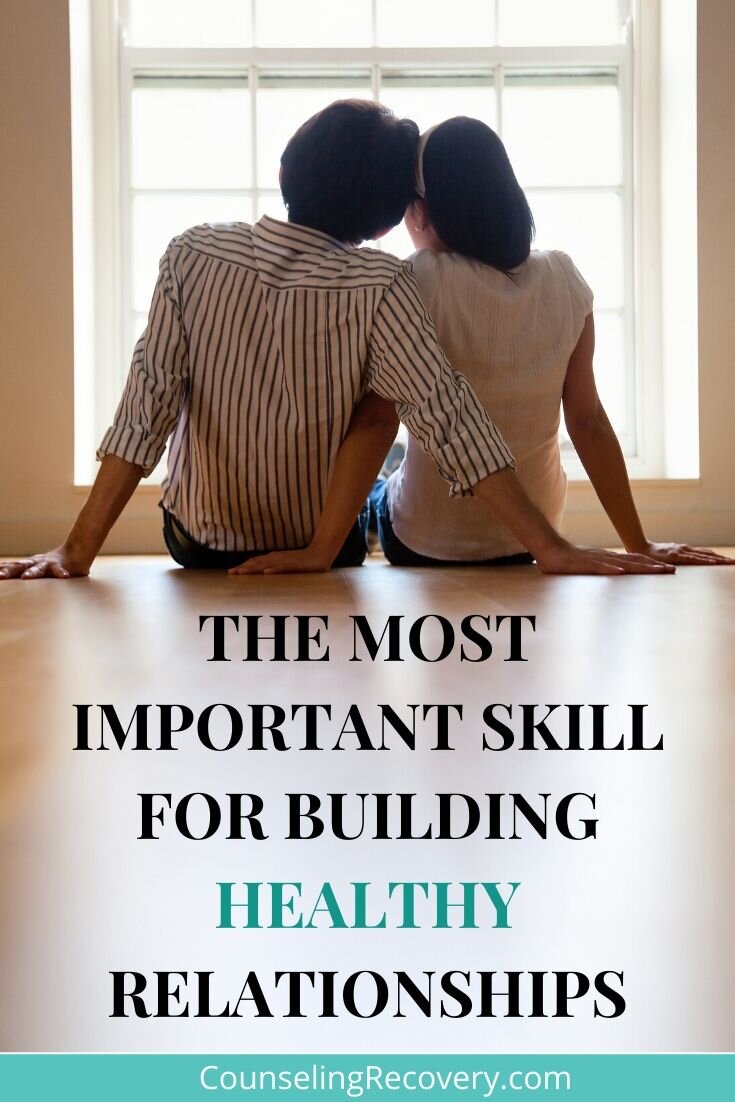The Most Important Skill For Building Healthy Relationships
Most of us want our relationships to last forever but many of them won’t. Conflict becomes the main hurdle most people get stuck in as their relationships progress.
A healthy relationship requires a unique set of skills that many people lack.
Some of these skills include:
How to communicate without blame or shame
Managing emotions like anger and defensiveness
Listening and validating someone else’s feelings
Providing support tailored to what the other person needs
Family Influences
How we do relationships starts with our original family of origin. They serve as our most powerful role-models.
These interactions create our first template for how to connect with others. Depending on what was learned, either you vowed to do the opposite (which by the way isn’t necessarily healthy) or repeated the same behaviors you witnessed as a child.
In this blog, you’ll learn the most important skill in building healthy relationships. I’ve tested this theory in my practice and in my own relationships in the last 30 years. This essential skill applies to any relationship - whether it’s with a friend, a partner, a parent or a child.
Of course, there are many other skills like being honest, trust-worthy and dependability, (and many others) that are important too but one skill becomes essential for any relationship to stay healthy.
What Most Relationships Lack
Relationships don’t progress in a healthy way unless people are willing to do the work. There are no short cuts. When people start having relationship problems they fall into a very common but dangerous trap. They assume that the other person needs to change instead of looking at themselves.
That’s the real problem. Becoming willing to look at our own behavior is the hardest shift I help people make. It takes courage to examine how we contribute to the problem but that’s where the gold is!
What Gets in the Way
Examining ourselves takes a willingness to acknowledge our imperfections. Fear, false pride and old, misguided beliefs prevent us from seeing the value in admitting fault. Instead of valuing this kind of honesty and introspection, we shun it to avoid shame.
We strive to be right instead of looking at the big picture but relationships can’t heal without accountability. Outdated beliefs like “having the last word” or “admitting fault shows weakness” make resolving conflict impossible. Both people stay stuck instead of being able to work things out and move forward.
The Most Important Skill for Building Healthy Relationships
Accountability is the single most important skill in any relationship.
Without it no one feels safe, acknowledged or respected. When someone denies their hurtful behavior, you feel disrespected, like your needs don’t matter right?
When abusive behavior is denied, the hurt gets amplified into not feeling safe. Being accountable means taking responsibility for our own behavior - not pointing out someone else’s.
When people lack accountability, problems don’t get resolved. They become grid-lock issues. As a result, the relationship’s “shelf life” dramatically decreases.
You may decide to give up and start over with someone else (and the pattern continues) or the hurt and resentment lingers until it creates separation in the relationship.
Without accountability:
People get stuck in conflict
Resentments intensify over time
Trust can’t truly develop
Arguments become a regular part of the relationship
But that isn’t the only option! Acknowledging how we’ve contributed to a situation changes everything.
How The Real Healing Begins
Instead of repeatedly blaming others for what’s going wrong, become willing to see how your behavior impacts others. This takes the focus off of other people and helps us find solutions. Your perspective changes because you no longer see yourself as the victim.
Seeing where you’ve contributed to the problem will make you more empathetic as you consider the other person’s point of view. This makes listening easier and resolving issues easier to practice.
Keeping silent is not the healthier choice. Saying nothing may give the impression that you’re not at fault. By taking responsibility for any part you’ve played in the outcome, resolution can happen.
What happens when you don’t see your part? Great question!
Accountability Tips
Here are some things to consider.
Be willing to look at anything you did before, during or after the situation.
For instance, your friend is upset because you said something offensive. Maybe your intentions were good but you denied any wrongdoing. You reacted defensively, blamed them or gossiped to a mutual friend afterwards. That is the behavior that needs examining.
Unless we’re talking about specific acts of abuse, there is always something to be accountable for. Something said directly or implied holds the same weight though indirect message can do more harm because it sends a mixed message (and makes the other person feel nuts).
Final Thoughts
By being accountable, you can develop healthy sense of pride and self-esteem. Conflict becomes less scary because you no longer avoid looking at yourself. You can admit when you’ve made a mistake without throwing yourself under the bus. Relationships become healthier because you can own your part and that’s something to be proud of!

